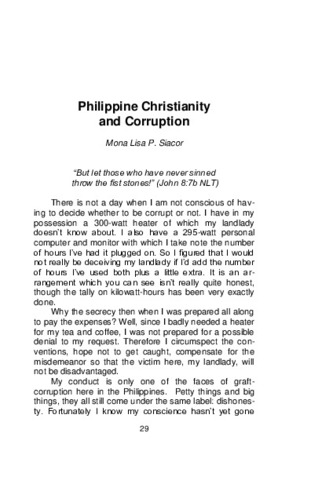Philippine Christianity and corruption
摘要
There are many instances when I have seen corruption to pay, the culprits getting away with their conduct and somehow gaining by it. No matter that they have committed an immorality, just as long as some cost has been cut, time has been saved, or labor has been conserved, then it’s all worth it. It is the consequences that are exactly the big issue here.
Is it a given fact that corruption goes round in a vicious cycle with poverty and illiteracy? Or does it start somewhere among the three? Is there an argument running here that sounds like: “People are corrupt because they are mal-educated,” or “People are corrupt because they are hungry?”
描述
Journal article
建议引文
Siacor, M. L. P. (2005). Philippine Christianity and corruption.文件类型
Article集合
- Journal articles [28]
- Journal of Theology [24]


